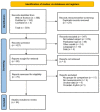Sleep Deprivation-Induced Oxidative Stress in Rat Models: A Scoping Systematic Review
- PMID: 37627596
- PMCID: PMC10451248
- DOI: 10.3390/antiox12081600
Sleep Deprivation-Induced Oxidative Stress in Rat Models: A Scoping Systematic Review
Abstract
Sleep deprivation is highly prevalent in the modern world, possibly reaching epidemic proportions. While multiple theories regarding the roles of sleep exist (inactivity, energy conservation, restoration, brain plasticity and antioxidant), multiple unknowns still remain regarding the proposed antioxidant roles of sleep. The existing experimental evidence is often contradicting, with studies pointing both toward and against the presence of oxidative stress after sleep deprivation. The main goals of this review were to analyze the existing experimental data regarding the relationship between sleep deprivation and oxidative stress, to attempt to further clarify multiple aspects surrounding this relationship and to identify current knowledge gaps. Systematic searches were conducted in three major online databases for experimental studies performed on rat models with oxidative stress measurements, published between 2015 and 2022. A total of 54 studies were included in the review. Most results seem to point to changes in oxidative stress parameters after sleep deprivation, further suggesting an antioxidant role of sleep. Alterations in these parameters were observed in both paradoxical and total sleep deprivation protocols and in multiple rat strains. Furthermore, the effects of sleep deprivation seem to extend beyond the central nervous system, affecting multiple other body sites in the periphery. Sleep recovery seems to be characterized by an increased variability, with the presence of both normalizations in some parameters and long-lasting changes after sleep deprivation. Surprisingly, most studies revealed the presence of a stress response following sleep deprivation. However, the origin and the impact of the stress response during sleep deprivation remain somewhat unclear. While a definitive exclusion of the influence of the sleep deprivation protocol on the stress response is not possible, the available data seem to suggest that the observed stress response may be determined by sleep deprivation itself as opposed to the experimental conditions. Due to this fact, the observed oxidative changes could be attributed directly to sleep deprivation.
Keywords: CAT; GSH; GSSG; MDA; NOx; SOD; catalase; glutathione; lipid peroxidation; nitric oxide; oxidative stress; rat; sleep; sleep deprivation; stress; superoxide dismutase.
Conflict of interest statement
The authors declare no conflict of interest.
References
-
- Kocevska D., Lysen T.S., Dotinga A., Koopman-Verhoeff M.E., Luijk M.P.C.M., Antypa N., Biermasz N.R., Blokstra A., Brug J., Burk W.J., et al. Sleep Characteristics across the Lifespan in 1.1 Million People from the Netherlands, United Kingdom and United States: A Systematic Review and Meta-Analysis. Nat. Hum. Behav. 2021;5:113–122. doi: 10.1038/s41562-020-00965-x. - DOI - PubMed
-
- Colten H.R., Altevogt B.M. Extent and Health Consequences of Chronic Sleep Loss and Sleep Disorders. National Academies Press (US); Washington, DC, USA: 2006. Institute of Medicine (US) Committee on Sleep Medicine and Research. - PubMed
Publication types
LinkOut - more resources
Full Text Sources
Miscellaneous


